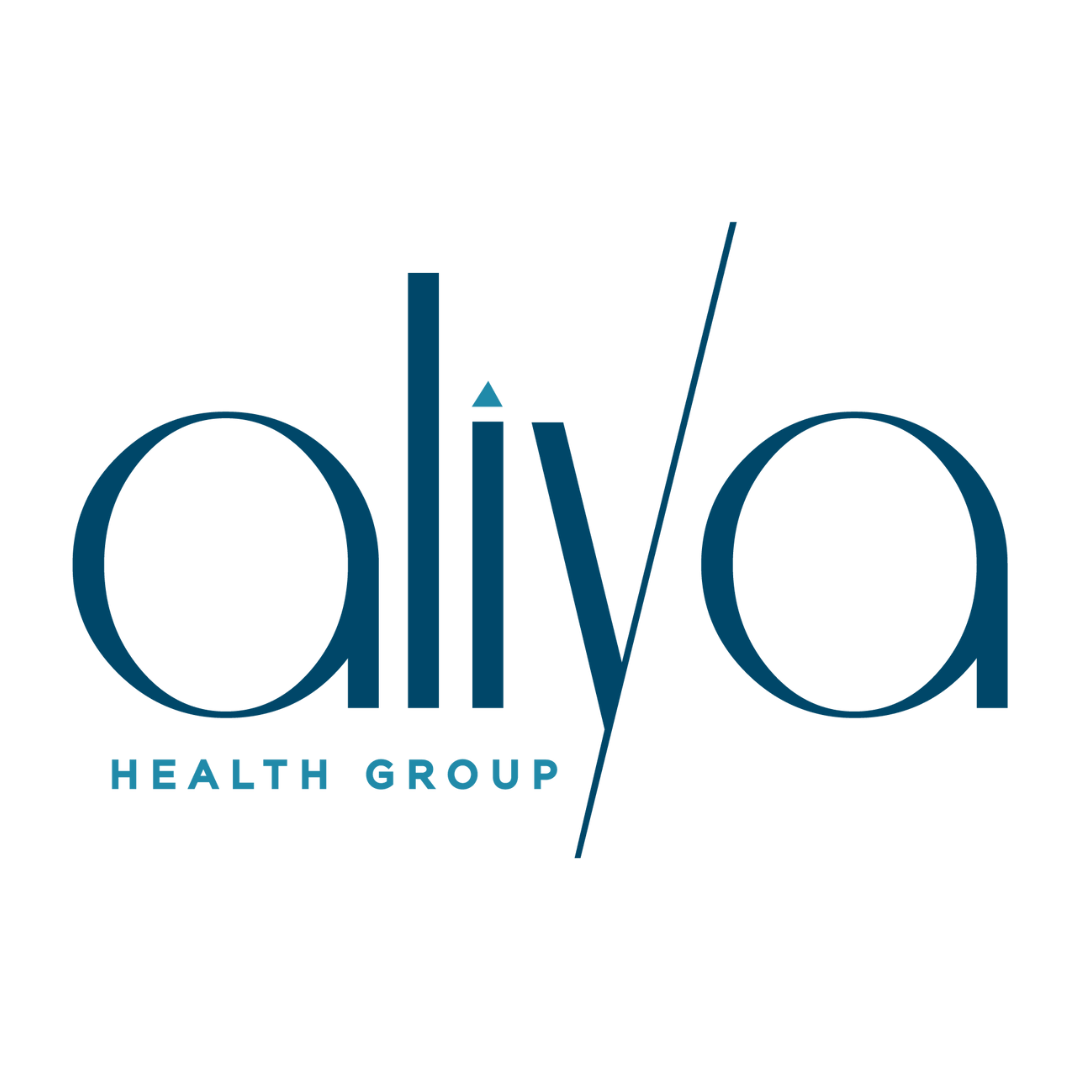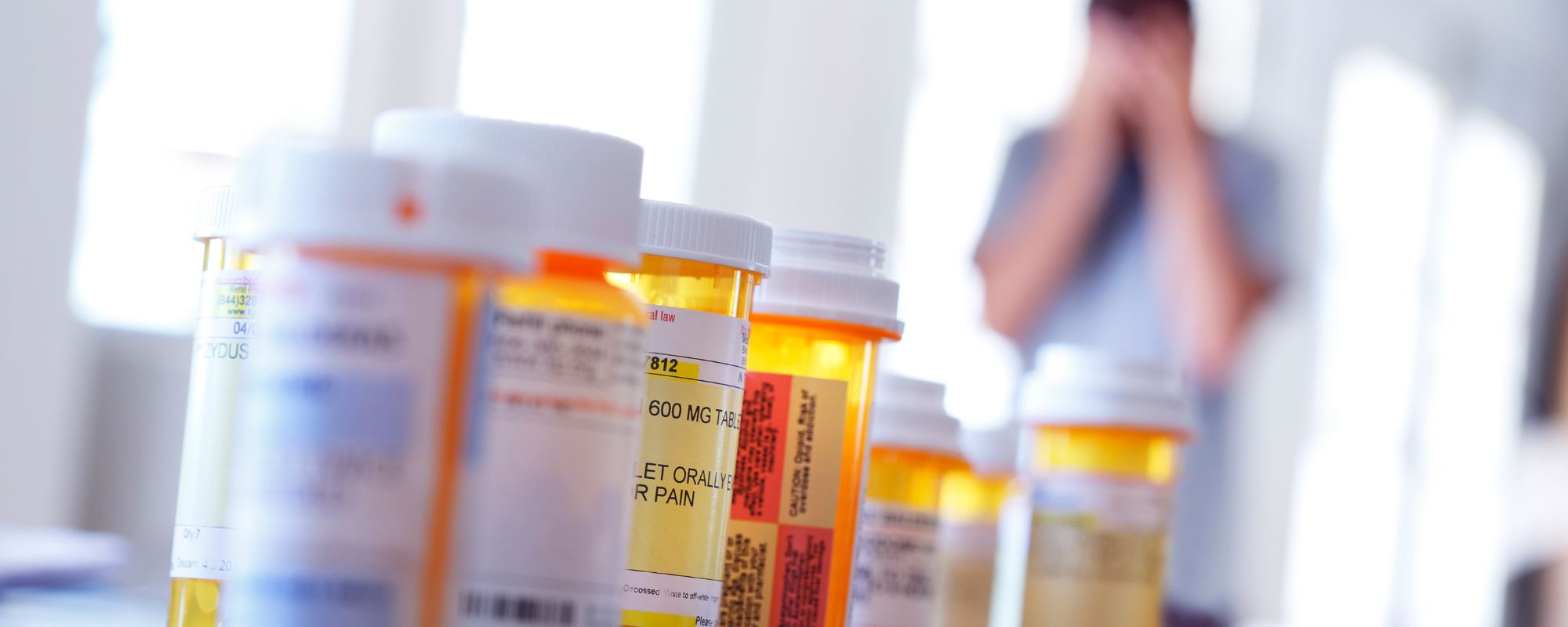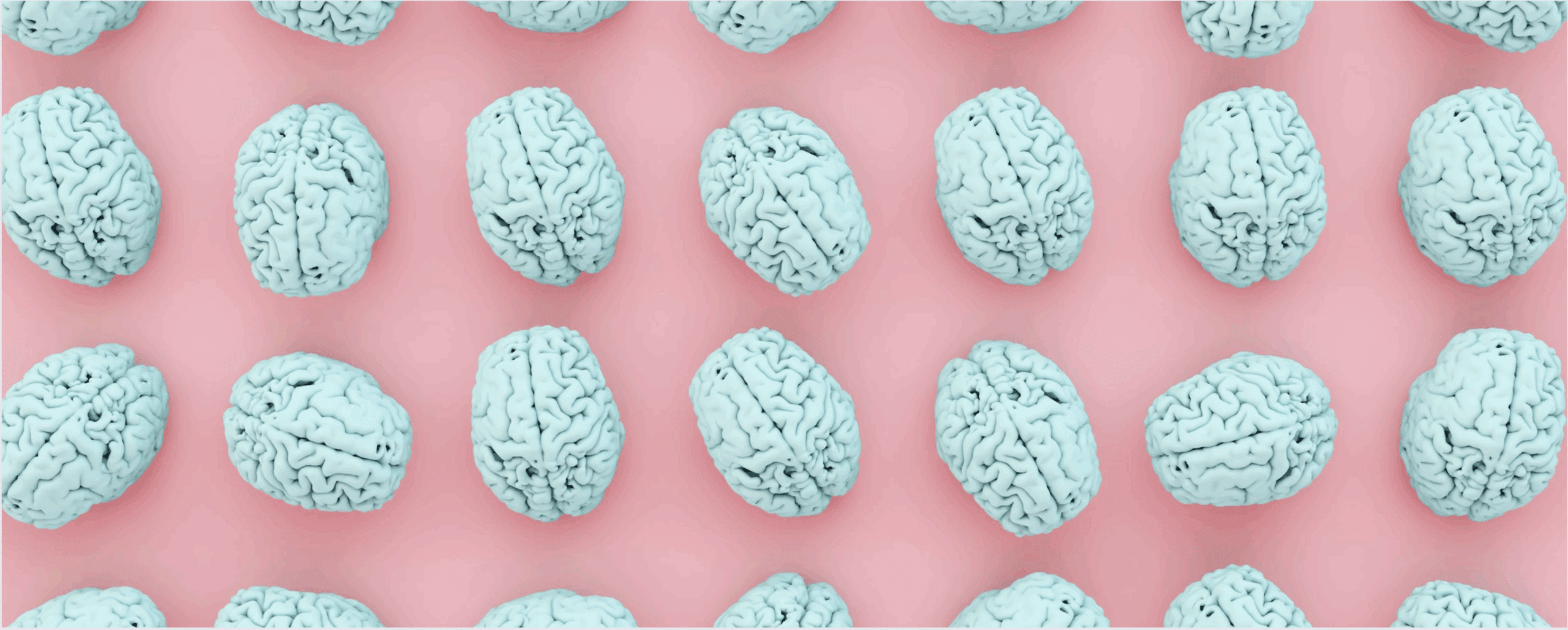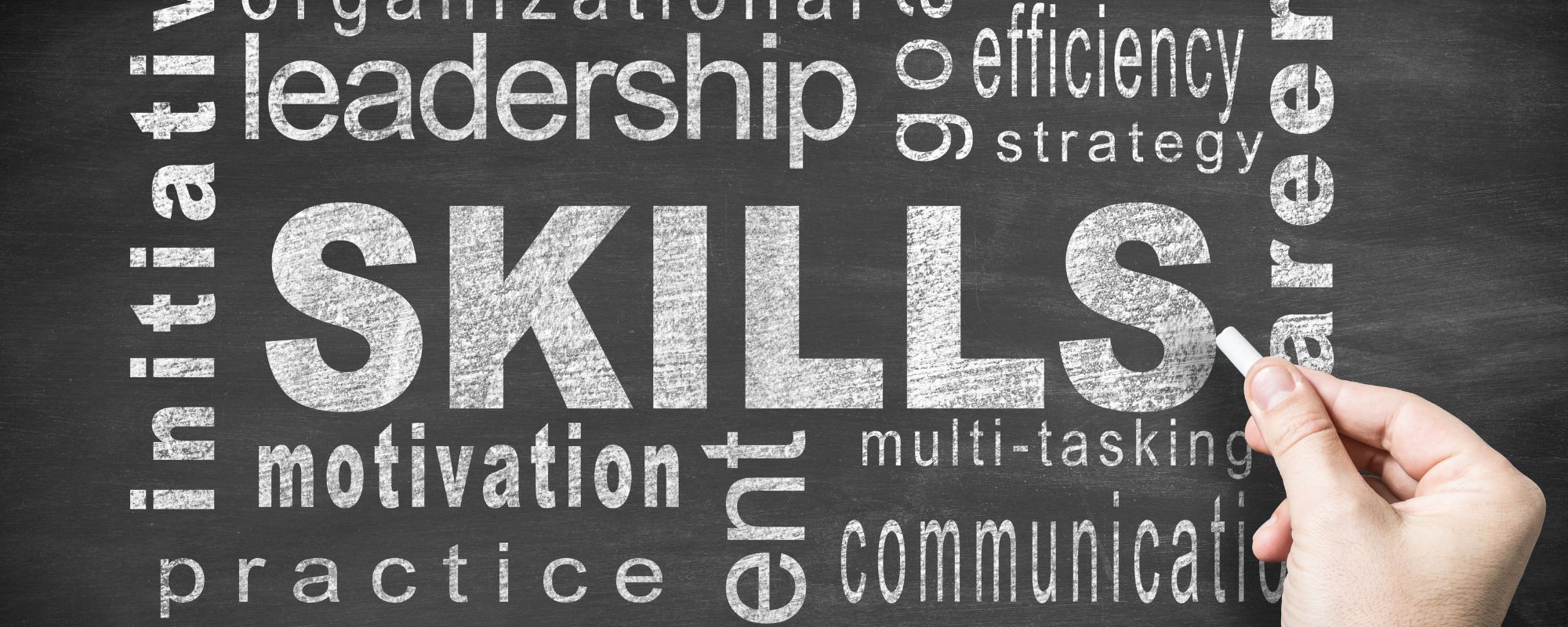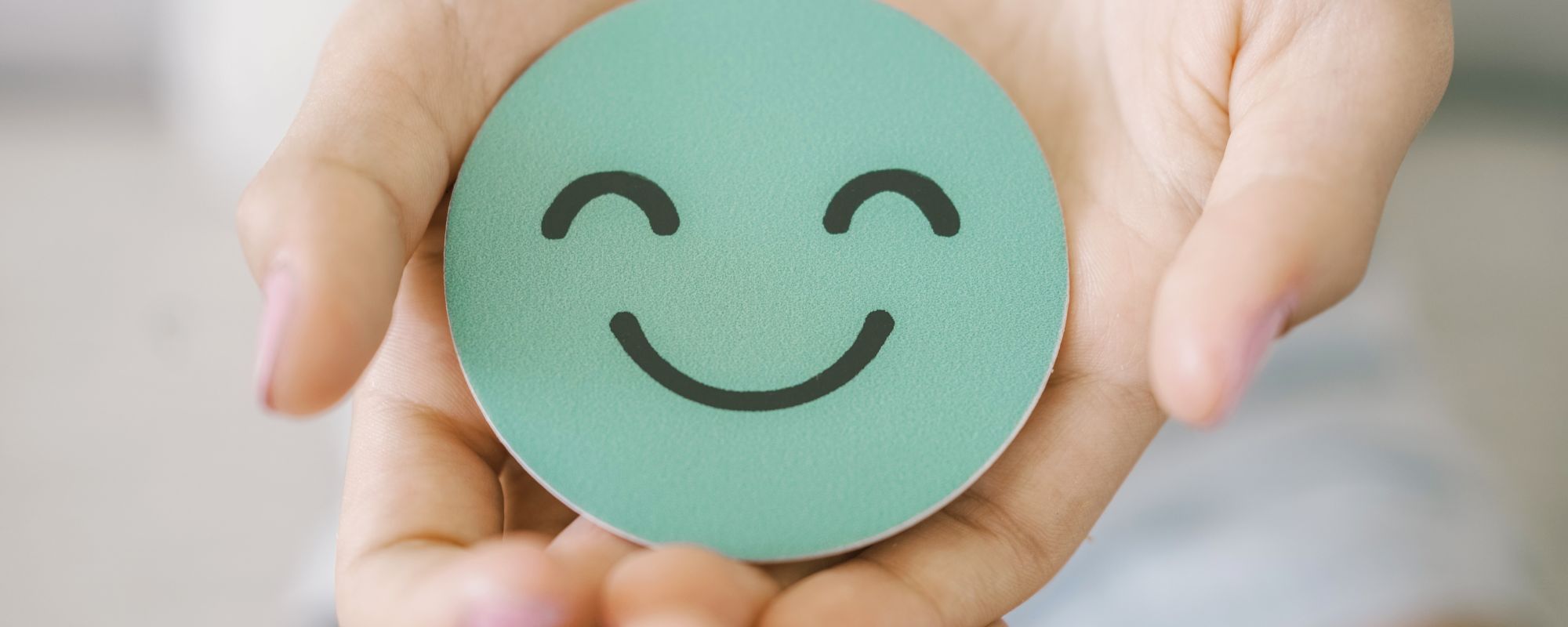Drug addiction is a far-reaching and complicated issue that affects millions worldwide. In 2021, 46.3 million people aged 12 or older had a substance use disorder (SUD) in the past year, including 24.0 million who had a drug use disorder and 7.3 million people who had both an alcohol use disorder and a drug use disorder. Understanding drug addiction and why some get caught up in its drip leads to a commonly asked question: What is the most addictive drug?
What Is Drug Addiction?
According to the Diagnostic and Statistical Manual of Mental Disorders, addiction is defined as a chronic, relapsing disorder characterized by compulsive drug seeking and use despite adverse consequences. While people can become addicted to many substances from coffee to gambling, drug addiction (or substance use disorder) can be difficult to overcome.
Getting hooked on drugs like marijuana, nicotine, or heroin can happen to anyone. It often starts when someone tries a recreational drug in social situations, just to see what it’s like. But for some, especially with opioids, things escalate and become more regular. With opioids, it can even start when someone takes prescribed medicines or gets them from others who have prescriptions.
Different drugs have different risks, and some, like opioid painkillers, can get you hooked faster than others. So, it’s important to be aware of the risks and how quickly addiction can happen.
Understanding the neurobiology of drug addiction is important. The most dangerous drugs impact the brain’s reward system, creating a cycle of cravings and compulsive use. This leads to a cycle of addiction and the need for a professional treatment program.
Get confidential help from our addiction and mental health treatment facilities located across the United States. Call to join one of our quality programs today!
Speak With Our Admissions TeamWhat Are the Signs and Symptoms of Drug Addiction?
Recognizing the signs and symptoms of drug addiction can help you recognize when to seek help for yourself or a loved one. Common signs of drug addiction include:
- Behavioral Changes: Abrupt mood swings, irritability, or a decline in personal grooming habits.
- Physical Changes: Unexplained weight loss, bloodshot eyes, or a noticeable decline in coordination.
- Social Withdrawal: Isolation from friends and family, forsaking previously enjoyed activities.
- Financial Issues: Frequent requests for money with no clear explanation, stealing, or selling personal belongings.
- Tolerance and Withdrawal: The need for increasing amounts of the substance to achieve the same effect and experiencing physical or emotional symptoms when not using.
What Is the Most Addictive Drug?
Determining the single-most addictive drug is a challenge due to individual susceptibility, method of use, and the presence of other substances. Nonetheless, certain drugs are notorious for their addictive potential.
- Alcohol: Many people wonder, “Is alcohol a drug?” Yes, it is, and despite its legal status, alcohol ranks high in addictive potential, impacting the brain’s reward system. Long-term use can result in severe health issues, including liver damage and cognitive impairment.
- Cocaine: A powerful stimulant derived from the coca plant, cocaine increases dopamine levels, leading to intense pleasure. Short-term effects include heightened alertness and energy, but long-term use can result in severe cardiovascular issues and addiction.
- Benzodiazepines (benzos): Prescribed for anxiety and sleep disorders, benzos can be highly addictive. Prolonged use can lead to dependence and withdrawal symptoms, requiring careful tapering under medical supervision.
- Methamphetamine (meth)
Another powerful stimulant, meth triggers a surge of dopamine, creating intense euphoria. Chronic use can lead to severe dental problems, weight loss, and mental health issues. - Opioids: Prescription painkillers and illicit drugs like heroin fall under the category of addictive drugs. They also bind to receptors in the brain. Opioid addiction can lead to respiratory failure, contributing significantly to the ongoing opioid epidemic.
- Nicotine and Cannabis (marijuana): Substances like nicotine and cannabis, perceived as less harmful, can also lead to dependence and addiction.
While these substances are known for their addictive nature, it’s crucial to acknowledge individual responses, understanding that any drug has the potential to lead to dependence.
Who Can Help with Drug Addiction?
Overcoming drug addiction often requires professional help. Treatment centers provide crucial support and guidance on the path to recovery from addictive drugs. While each treatment center offers different programs, they usually include variations of the following:
Detoxification:
- Medical supervision during the initial withdrawal phase helps manage potentially dangerous symptoms.
- Detox is the first step in breaking physical dependence.
Therapy and Counseling:
- Individual and group therapy address the psychological aspects of addiction.
- Identifying triggers and developing coping mechanisms are key components.
Medication-Assisted Treatment (MAT):
- Combining medications with counseling, MAT is effective, especially for opioid and alcohol addiction.
Aftercare and Support:
- Ongoing support is important. Aftercare programs, support groups, and counseling can help you maintain recovery.
Comprehending drug addiction and substances with high addictive potential is crucial for prevention and treatment. If struggling with addiction, seeking professional help is the initial step toward a healthier, drug-free life. The journey to recovery is challenging, but with the right support, it’s a real possibility.
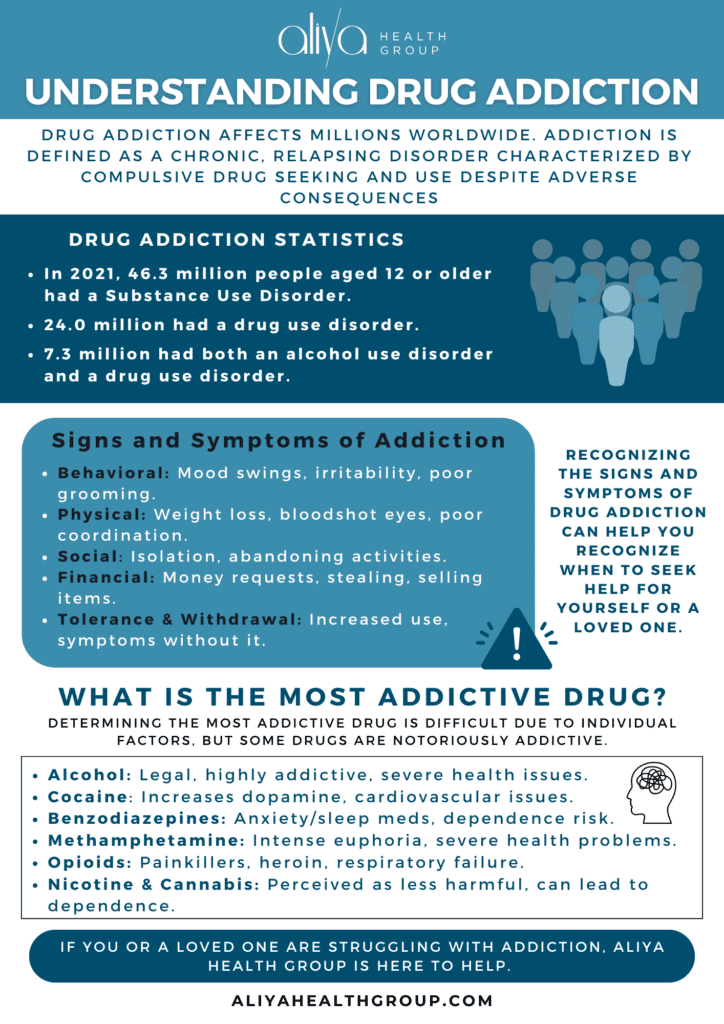
Looking for quality treatment for substance abuse and mental health that’s also affordable? Aliya Health Group's treatment facilities accept most major insurance providers. Get a free insurance benefits check now!
Check Your CoverageDrug Addiction Treatment at Aliya
At Aliya Health Group, our drug addiction treatment centers draw on a blend of evidence-based traditional therapies, and experiential and alternative approaches. We also offer medication-assisted treatment programs. Our programs are tailored to help you effectively recover from alcohol and drug addiction, ensuring your safety and comfort throughout the healing process.
Our nationwide rehabilitation centers offer evidence-based treatment programs for those struggling with drug addiction. To successfully treat alcohol and drug abuse, we provide a full continuum of care across our treatment center locations. Our addiction treatment programs include:
- Medical detox program
- Residential treatment program
- Partial care (PC) program
- Intensive outpatient program (IOP)
- Outpatient program (OP)
Our inpatient programs, including detox and residential care, provide round-the-clock medically supervised support, along with holistic therapies. All therapies are conducted in the peaceful environment of our your own treatment residence, which allows us to maintain a focused and personalized approach to treatment. Whether on an individual basis or in small groups, our addiction treatment programs are designed to meet the unique needs of each client.
After completing inpatient treatment, clients can transition through PC and IOP to continue receiving comprehensive support to ensure the best possible outcomes. Following aftercare, clients can also participate in our customizable outpatient treatment programs for ongoing support and guidance.
At every step, we create personalized treatment plans to guide our clients throughout their addiction recovery journey. If you or a loved one are struggling with drug addiction, contact us today.



